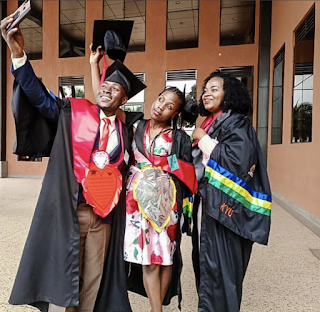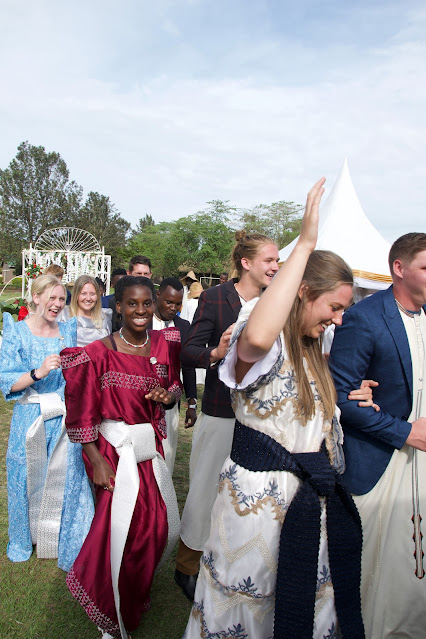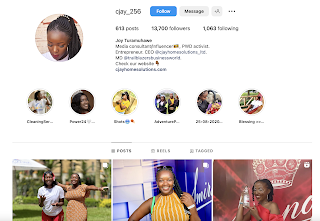At home in Rakai, Uganda
Physical Geography
Uganda is a landlocked country, bordered by Kenya, South Sudan, Democratic Republic of Congo, Tanzania and Rwanda. The country is a total of 241,552 square kilometers. Uganda is basically the size of Oregon, with the population of Canada!
Uganda has two seasons, rainy and dry, the first rainy season begins in March and has the most rainfall, the second begins in September and that is less rainy. Temperature in Uganda is generally between 25-35 degrees Celsius. Most people are surprised to know that Uganda is much more rainforest than it is savannah.
Rakai District, where I live in Uganda is in the Central Region, and is close to Tanzania and approximately 168 km from the capital city, Kampala.
Population Analysis
Population breakdown
Religious breakdown
Age Breakdown
Other Facts
41% of the population live in poverty
76% of the population live in rural areas
73% of people working are employed in agriculture
41% of people live on less than $1.90/day
53% of children complete primary education
42% of households have access to the internet
Migration assessment
Majority of the people in the Rakai District of Uganda were born here or fled here from Rwanda during the Genocide.
People from Tanzania move here because the weather is better for growing crops.
People will leave this area if they get an education and will move to a larger city for better employment. If people leave the country it is generally for Kenya which is more developed than Uganda, or to Dubai which is easy for Ugandans to get into.
2014 Population in Rakai - 518,000
2023 Population in Rakai – 620,000
Transportation Analysis
The most common form of transportation where I live is to walk!
Most people in this area cannot afford a vehicle on their own, and they often can’t afford to get a taxi. So walking is the most common way to get around. On average, people in our community walk:
· 3 hours each way to reach our health centre
· 1 hour each way to access clean water
· 2 hours each way to go to school
· 3 hours each way to buy food, clothes and supplies in town
A taxi would be the next most common form of transportation. A taxi looks different here than in Canada, it is a small bus that technically fits 14 people, but usually there is close to 20, and probably a few chickens as well! Something interesting about a taxi here is that it doesn’t leave the stop until it is full, so sometimes you are waiting a long time until you can go!
My favourite form of transportation is a boda boda, which is a small motorcycle, it is also like a taxi, but for short distances. They’re really common in the cities, but even in our small village you could easily get on a boda boda. I’ve been riding on them since I was a baby, back then I was with my mom or dad but since I was about 4 I would ride on them on my own. Although sometimes, if you’re wearing a skirt or dress, you have to ride them sideways, which we call side-saddle, and that is no fun. This would be a bit more expensive than a taxi, but you get where you’re going a lot faster.
For long distances, to get from one district (which is like our provinces) of Uganda to another or even to get to Kenya, Rwanda or Tanzania, you would take a coaster bus. I don’t really love these because they can often be really hot and the drivers are not very careful, so you see a lot of car accidents with coast buses, but they seat lots of people, at least 25, and it’s inexpensive, so it’s very common here.
Lake Victoria, which is the largest lake in Africa and the second largest lake in the world, is in Uganda and for that reason boats are also a common form of transportation here. There are a few parts of Uganda that you can only reach by boat, or a boat or ferry are the best ways to get there.
There are cars and trucks here, but it is not common for most people to own their own, it wouldn’t even be middle class that owns their own vehicle, it would be higher earning people only. You can do a ‘special hire’ and that is when you hire the car and driver to take you wherever you want to go, this is the most expensive way to get around Uganda, but still cheaper than owning your own car.
Land Use Assessment
In Rakai 80 percent of the population are peasant farmers, so there is agriculture everywhere. More than 70% of families are growing maize, and beans, 40% of families grow matooke and less than 20% grow sweet potatoes, millet and other small crops.
There are also a few large lakes in Rakai, and because of that people are starting to eat fish and catch fish more and more, even though culturally it wasn’t a food that was common in their diet, they are adapting because of this natural resource.
Cash crops include coffee, fruits and vegetables like tomatoes, pineapples, onions and cabbage. There is also people that own cattle.
Political Organization
Uganda has a President, they are the head of the Executive Branch, head of state and is also Commander in Chief of the armed forces. He is responsible for implementing and enforcing the laws written by Parliament and they also appoint the Cabinet.
The Vice President is part of the Executive Branch and is ready to assume the Presidency, if needed.
Yoweri Kaguta Museveni Tibuhaburwa, mostly knows as President Museveni, is the 9th President of Uganda and came into power on January 26, 1986. Although a term is 5 years in Uganda and you are only supposed to run twice, Museveni has been the president now for 6 terms. Many people in the country claim that it is due to corruption but he himself says that it is by fair election and that being in power for so many years makes him a great leader. He plans to continue running for president and being the president.
The area of Uganda where I live is called Rakai and it is one of the poorer districts of Uganda. Majority of the population are peasant farmers. Most educated people will leave this district once they graduate university for a better job.
Rakai borders the country Tanzania so there are many trucks come through the district, which means there are a lot of police checks to make sure that things coming into the country have proper documentation.
Each District now has a local government in Uganda. They are responsible for education, health, water, rural roads, production and marketing as well as tourism. Rakai’s Chief Administrator Officer, Kamara William, has said that this district is, “challenged with inadequate financial, human and logistical resources to fulfill these mandates.”
Facebook has been banned in Uganda since January 2021, all social media was banned then during the election. Twitter and Instagram have returned, but not Facebook. Everyone in the country knows that you can use a VPN to access Facebook though, so although it is officially banned there are still a lot of posts from Uganda.
Culture
Uganda has a very diverse culture, there are over 50 tribes here and they of course all have their own unique cultures. Where I live the most dominant tribe is the Buganda tribe and it is also the largest tribe in Uganda. So that is what I am going to be talking about.
I would say that the culture in Uganda is being preserved very well. Although there are definitely western influences here, you can still see the traditions being held. The traditional clothing’s, a gomesi for women and kanzus for men, are still worn to all weddings and special holidays, as well even to church on a Sunday morning.
The schools are encouraged to still teach the traditional dances and songs, and you will frequently see this in morning assemblies or on parents days.
Even the weddings are quite traditional still, there are two events here, an introduction and then a wedding ceremony, the introduction is a cultural ceremony and the wedding more of a western influence, but in our area of Uganda the introduction is a much bigger deal!
The way of life is also still very much keeping with old tradition, I would never know people are dating until they are engaged, a pregnancy is never talked about, ever, and there is no touching at all between couples in public.
I asked a few people about preserving the culture and they said a lot is done through the schools, but also the elders are so respected here, and that is a big reason for the preservation.
When I think of traditional music in Uganda I think of the drums! If there is singing, there is dancing, and there is always someone playing the drums here. I can’t think of an event I’ve been to in Uganda where a dance party doesn’t just happen and I love it!
There is normal dancing, like you’d see in western cultures, but there is also traditional dancing, with costumes usually in the colours of the Ugandan flag. The most common traditional dance is the royal court dance, called Ngoma. This is a ritual dance that was created to entertain the King (or Kabaka as it’s called here). Music and dance is definitely the biggest art that I see in Uganda. But there is also a lot of artists who draw and paint. Any craft market that you go to has canvas after canvas of artwork that you can buy. The art class at our school here is one of my favourite places to go, everyone is so talented! There is also a lot of handmade crafts, like jewelry and baskets, and art that is made of wood is also very common here.
Contemporary Culture
The emerging film industry in Uganda is known as Ugawood. Films made in Uganda, for Ugandan audiences, is also referred to as Kinna-Uganda. It is said that ‘The Last King of Scotland’ a movie based on Ugandan dictator Idi Amin which was also partly shot in Uganda helped to start the film scene here after it was so well received.
I think something unique about this emerging industry is having people portray Uganda exactly as it is, the stories are relevant to people living here, the film makers are not guessing at what life is like, and of course that would make people here more interested in watching these movies.
The film industry has had a big economic growth in countries like Nigeria, Ghana, South Africa and Kenya, and there is definitely potential for the same thing to happen for Uganda. Some have said the potential of the film industry is unparalleled. Film also has a huge influence on culture, politics, the economy and future generations, filmmakers in Uganda can tell good stories, share good things, and that is important to preserve culture.
There is already a Uganda Film Festival every year to promote the film industry that is called the Pearl International Film Festival. There are 5 movie theatres in Kampala, and although they do show blockbuster western movies, there is also a lot of Ugandan or African made movies to see which is very exciting!
3 Social Media Influencers in Uganda
Bobi Wine (aka Robert Kyagulany Ssenatamu)
Bobi Wine is a Ugandan singer, politician, businessman and philanthropist. He is 41 years old, married and has 4 children.
Bobi Wine has been in the public eye for a very long time. He actually started to become famous as a singer in the early 2000’s as an Afrobeat artist. He had a lot of musical hits and gained a lot of fans. He had a song in the popular Disney movie, Queen of Katwe, that was released in 2016, “Kiwani”, which helped take his national recognition to international. His YouTube channel grew and his followers were in the tens of millions.
When his fame and popularity was at its highest Bobi Wine decided to run for President. He had spent some time in local politics and when he began winning elections by a wide margin he decided to keep going for higher government titles. He did not win the presidential election and his time in politics has ultimately tainted his reputation; his campaigning came with a lot of chaos, riots and protests, especially around Kampala, Jinja and Masaka, the bigger cities in Uganda.
He is passionate about improving the living conditions for the poor in Uganda. He grew up in a slum neighborhood himself, and that is what made him passionate about this cause. He also has spoken out about malaria prevention. He loves Uganda and is definitely one of the most influential people that is known, he even won African Influencer of the Year in 2022.
Phiona Mutesi (aka The Queen of Katwe )
Phiona was born in 1996, in Kampala, Uganda and gre up in the Katwe slum, which is the largest slum in Uganda. Phiona’s dad died when she was young and she had to start working with her mom selling things at the market in order to survive, so from the age of 9 she could no longer go to school. She started to take part in an afterschool program though and that is where she learned the game of chess.
It was said about her that with knowing her lack of education and the home life she came from, her chess playing skills are incredibly remarkable. After her success with playing chess around the world, Phiona was offered a scholarship at the Northwest University in Washington.
Phiona currently lives in the USA and is a motivational speaker but also supports organizations in Uganda. She talks to young girls especially about overcoming adversity, taking opportunities and realizing your dreams!
Phiona was recognized as the most influential athlete in Uganda at the Commonwealth Games, where there is only athlete from each country selected for this title.
Joy Turamuhawe
Joy is the CEO of her own company based in Uganda, Cjay Home Solutions, that cleans houses and and also offers fumigation services for businesses and home residents. She has recently graduates with a Business degree from Makere University.
She is most famous though for her social media platforms; TikTok, Instagram, and Twitter. She uses her platform to talk about her business, ideas and tips for cleaning but also talks and shares a lot of information about starting a business and being a female influencer in Uganda. She is passionate about gender equality in the workplace and supporting persons with disabilities.
She was attending business school but during the pandemic had a lot of time on her hands, and that is how this business came about. She is now not only a successful business woman, but is using her social media platform to encourage others and share what she believes in. She is definitely well respected in the community! She has now been able to travel, attend the Uganda Film Awards and share about her passions!













































Comments
Post a Comment